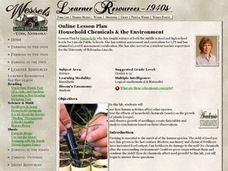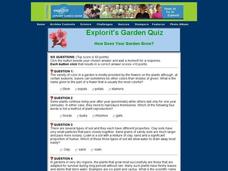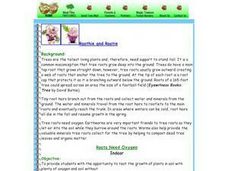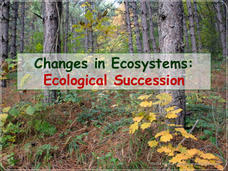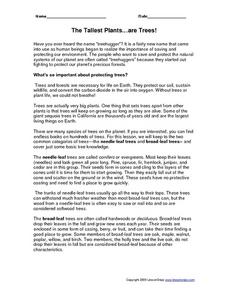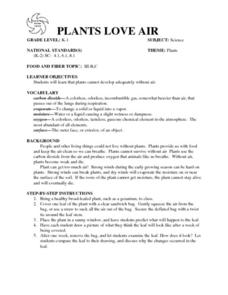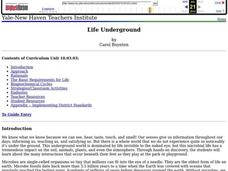Curated OER
Vermicomposting
Fourth graders explore insect life by viewing a soil presentation in class. In this composting instructional activity, 4th graders read assigned text about the process of composting soil and the necessity of soil in plant life. Students...
Curated OER
Household Chemicals & the Environment
High schoolers conduct a laboratory experiment designed to investigate the effects of chemicals, soil quality and pollution on seed growth and plant yield. They consider how best to maximize agriculture in the long term.
Curated OER
Sustainable Agriculture
Students perform an experiment to find out if plants grow best when grown in soil with no fertilizer, with chemical fertilizers, or with compost that they have made themselves. Students discover how agriculture practices can benefit the...
Curated OER
Explorit's Garden Quiz: How Does Your Garden Grow?
In this plants activity, students complete a 6 question multiple choice quiz about gardening, plants and agriculture. This is an online interactive activity.
Curated OER
Baby Peanut Plants
Science is a subject ripe with opportunities to read informational text. Kids read to learn about peanuts! They read an informational passage, fill out two comprehension worksheets, and then conduct a lab experiment on a peanut. The...
Curated OER
Roots Need Oxygen
Students investigate the growth of plants in soil with oxygen and soil without oxygen. They discuss what roots need to survive, and chart the growth of two plants to analyze the difference between plain soil and soil with two earthworms.
Curated OER
Hold on Tight!
Students explore the relationship between plant roots and the soil in which they grow. They examine photos of uprooted trees and desert areas and
conduct experiments designed to highlight this mutual relationship between roots and soil....
Biology Junction
Changes in Ecosystems: Ecological Succession
Can an area with no soil turn into a forest? Scholars learn about the process of ecological succession using an interesting presentation. It covers both primary and secondary succession in the building of new ecosystems.
Curated OER
All About Seeds!
How do fruits relate to flowers and seeds? Identify the seeds and their purpose with a coloring activity for kindergartners. Once they color the seeds of apples, bananas, and peas (among others), kids get hands-on experience with bean...
National Christmas Tree Association
Merry Christmas, Geraldine
If you're reading the story "Merry Christmas, Geraldine" by Holly Keller, this is a fantastic cross-curricular resource to use. Complete with activities for language arts, science, social studies, art, and math, you'll get the most out...
Curated OER
The Dirt We Depend On- Characteristics of Dirt Reading Comprehension Worksheet
In this reading comprehension activity, students read a selection about dirt and soil characteristics. They answer 10 matching questions and 5 multiple choice questions based on the information given in the non-fiction article.
Curated OER
The Tallest Plants ... are Trees!
A fabulous worksheet about trees awaits your students. They read a lengthy selection on the various parts of trees, then complete 13 fill-in-the-blank and matching questions about what they have read. An excellent reading comprehension...
Curated OER
PLANTS LOVE AIR
Young scholars identify that plants cannot develop adequately without air and predict what happens to the leaf of a geranium brought to class. They draw a picture of what they think the leaf will look like after a week of being covered....
Curated OER
Defining Drought
Students examine the hydrologic impacts of drought. Humans can change the course of the water cycle, to some extent, to meet their needs, but can they do so without imposing risks on the plants and animals?
Curated OER
Forest In A Jar
Students conduct an experiment using soil, water, seeds, a plant, and a jar; and then draw a poster to represent their observations and findings. They make a poster showing what happened to their aquatic environment.
Curated OER
F.B.I.
Learners create a worm bin full of fruit and vegetable scraps wit paper and observe what happens over time. In this decomposers lesson plan, students observe that the fruit and vegetable scraps become new soil.
Curated OER
Life Underground
First graders build a terrarium in order to observe animal and plant life dynamics. In this biology lesson plan, 1st graders compare how organisms survive in different environments. They write their observations and analysis in their...
Curated OER
WALK, DON'T RUN
1. Bring two quarts of moist soil, a cake pan, a sprinkling can of water and a quart of grass clippings to class.
2. Share background material, and introduce the word "erosion."
3. Prepare a small model hill by mounding the soil in the...
Curated OER
Wiggley Worms
Young scholars investigate how worms affect plant growth. In this biology lesson, students construct a worm ecosystem in a plastic 2 liter bottle and plant a seed in the soil. They later compare the ecosystems with worms to ones...
Curated OER
Microorganisms: Good Guys or Bad Guys?
Students discover the role microorganisms play in our lives. In this decomposition lesson, students examine decaying foods and plants in order to analyze the different bacteria that grows. Students discuss the good and bad of...
Curated OER
Leaves and Photosynthesis
In this science learning exercise, students read detailed information about green plants and the photosynthesis process. In this fill in the blank and true and false learning exercise, students answer twelve questions.
Curated OER
A DAY WITHOUT AG
Students consider and discuss the meaning of the word "agriculture" and how agriculture affects their lives every day. Students identify the various ways that agriculture touches their personal lives. Students use worksheets to list all...
Curated OER
DON'T TREAD ON ME
Students explore how the habits and practices of people affect the soil and growth of plants. They are introduced to the phrase "soil compaction." Students play the Soil Particle Game in the related activities section. They go outside...
Curated OER
Circles in the Landscape: Irrigating Oklahoma Crops
How do you grow crops in a area with insufficient rainfall? Why you irrigate, of course. Class members investigate irrigation systems by designing a system of their own. After examining irrigation related concepts, vocabulary terms, and...



